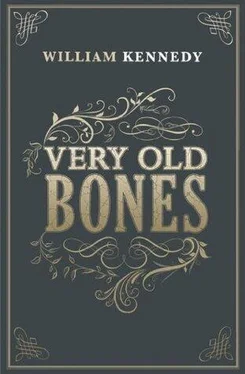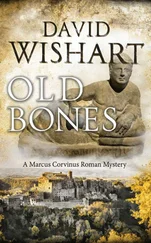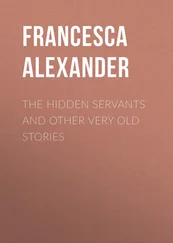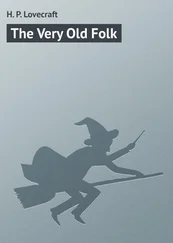I explored the downstairs rooms, finding photographs of my father when he was a youth (wearing a high collar and a short tie; he never dressed like that anymore), and photos of the women I’d just seen, but as girls in bathing suits (with their mother, was it? mother in black long-sleeved high-necked beachwear that came to her shoetop), and I saw a cut-glass dish full of apples and oranges and grapes on the dining-room table and a photo of twenty men posing beside a locomotive, and over the piano a photo of a woman who looked like the beautiful Molly but more beautiful still, and younger, with her hair parted in the middle, and when Peter saw me looking at it he said, “That’s my sister Julia, Orse,” and he whispered in my ear, “Don’t tell anybody, but she was my love, my favorite,” and he said Julia had played the piano. He opened the seat of the piano bench and took out a scroll of paper titled “In the Shade of the Old Apple Tree.”
“She played this one all the time. We both loved it.”
He opened a sliding door on the piano’s upright front and inserted the roll, then sat at the piano and pumped its two pedals with his feet, and the roll moved as I watched with wonderment. Paper that makes music? Then Peter stood up and sat me in his place and told me to put my feet on the pedals and press, first left, then right, and I did and saw the paper move, and then I heard music, saw the keys on the piano depress themselves, and I said, “It’s magic!”
“Not quite,” said Peter, and I kept pumping and then my feet weakened, as did the song, and Peter said, “Faster, kid, keep a steady rhythm,” and after a while the jerkiness went out of the song and out of my feet and the piano made beautiful music again and Peter sang along.
I can hear the dull buzz of the bee
In the blossom that you gave to me,
With a heart that is true,
I’ll be waiting for you
In the shade of the old apple tree.
“Are you insane? Are you out of your mind?”
It was Sarah, back with her black mood, black skirt, fierce voice, and I stopped my feet and Peter said, “For chrissake, Sarah, I’m invoking Julia. Don’t you think she has a right to be here today? Are you going to keep this wake all to yourself?” And Sarah again could not answer, and fled to the kitchen, slamming the door behind her.
“Continue, Orse,” Peter said, and, as I moved my feet, music again rose in the rooms where light and death were on the way. The phone rang in the back parlor and Molly came down the stairs two at a time to answer it, then reported to all auditors that it was Ben Owens, the undertaker, and that he’d be here within the hour; which meant that Mama Kathryn would be returning to the front parlor to be observed in her death rigors, powdered and coiffed as she rarely had been in life; and to me it meant a question mark, for this was my entrance into the world of death.
Again the doorbell sounded and I placed myself in the angular hallway that ran from front door to back parlor, hiding behind wicker filigree decked with clusters of china, people in breeches and wigs and hoopskirts, and dogs and cats with flat bottoms, and then I saw a man with a happy and perfectly round face beneath a bald dome take a cigar out of his mouth and say to Peter, “I got your mother here.”
And Peter said, “Bring her in, she’s welcome,” and from the smiles that followed this exchange and from all the smiles and music and ongoing electrification, I would take home from this day my first impression of death: that it was an occasion for music, levity, light, and love.
“How’ve you been, Ben?” Peter asked.
“If I was any better,” said Ben, looking for a place to rid himself of the half-inch ash on his cigar, “I’d call the doctor to find out what ailed me.”
“In the window,” Peter said. And Ben swung his portly self toward the street and motioned to the four men standing at the back end of the hearse, and home came Kathryn Phelan, her last visitation in the flesh. Just ahead of her came another man with the catafalque, a four-wheeled accordionesque platform which stretched to meet the space, and upon which Kathryn and her mahogany coffin came to rest, the coffin’s closed cover gleaming in the sunlight (no electricity yet).
The onlookers now included Ben Owens, Molly, Sarah, Peter, me, and the electrician, who was on a ladder in the middle of the room installing the Claire chandelier, and who said, “Do you want this thing workin’ tonight?” and Peter said, “We do,” and the electrician said, “Well, then, I ain’t movin’ off a here,” and Peter said, “There’s no reason you should. Make yourself at home up there,” and so they moved the coffin around his ladder and the advent of the light proceeded as planned.
The family then retreated to the back parlor as Peter closed the sliding doors between the two parlors and waved a go-ahead sign to Ben Owens. And then the tableau that I would carry with me created itself: Peter sitting at the piano, Sarah standing by the kitchen door off the back parlor with folded arms, Molly settling into the armless horsehair ladies’ chair beside the piano and staring at Peter as he pumped up the music. I, sensing tension and trying desperately to make myself disappear, retreated to a far corner of the back parlor where I could observe the expanse of tradition and sibling relationships manifested in objects and body postures, and listen to love manifested in music, and perceive, I knew not how, the ineffable element that seeped under the closed parlor doors when the coffin was opened; all this fixing forever in me the image of life extended beyond death, and fixing too the precise moment of the advent of the light.
The electricity would insinuate itself from the power line on the outside pole, through the front wall, across the ceiling, and into the chandelier at the electrician’s touch, and the onset of the light would startle Ben Owens so that the comb he was using to touch up Kathryn Phelan’s hair would fly out of his hand and into a shadowy area behind the coffin, and Ben would say, “Cripes, what was that?”
And light would seep under the sliding doors to be greeted by Peter’s remark: “It’s here,” and the apple-tree song would end as light began.
The sliding doors would open onto the new tableau of undertaker, electrician, siblings, and myself, all of us staring at the corpse that was so regally resplendent in high-necked magenta burial gown and pink-taffeta-lined coffin, and Mame Bayly’s flowers would give sweet fragrance to Kathryn Phelan’s final performance — her first under the bright lights — on this very old stage.
Chick Phelan took a half-day off from his job as a linotypist in the Times-Union’s composing room for this first night of the wake, the night the family and a few select friends would have the corpse all to themselves. He brought home four bottles of Schenley’s whiskey and a box of White Owl cigars for the wakegoers, and announced his partial list of bearers for the funeral: the McIlhenny brothers, Dave and Gerry, nephews of Kathryn recently off the boat from County Monaghan; Martin Daugherty, Barney Dillon from across the street, and two more to be recruited at the wake.
Food began to arrive. Betty Simmons sent her teenage son over with a turkey and stuffing; the Ryan sisters baked a ham and made their famous potato salad and delivered it themselves but didn’t come in, would wait for the wake’s second night, when friends called. Flowers came: six baskets at once, one from George and Peg Quinn and family, plus the pillow of red roses from the Phelan children, with the word “Mama” in gold letters on a ribbon. When the deliveryman handed Peter the last basket of flowers and went back down the stoop to his truck, a figure came limping across the street and stood at the bottom step, hands in pockets, fedora at a rakish tilt, clothes old and grimed, and this man looked upward into Peter’s eyes.
Читать дальше












